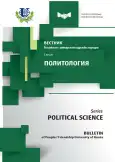No 1 (2015)
- Year: 2015
- Articles: 7
- URL: https://medbiosci.ru/2313-1438/issue/view/23018
- DOI: https://doi.org/10.22363/2313-1438-2015-1
ARTICLES
Agent-Based Modelling of the Evolution of the Russian Party System Based on Pareto and Hotelling Distributions. Part II
Abstract
The given article presents research of the evolution of the Russian party system. The chosen methodology is based on the heuristic potential of agent-based modelling. The author analyzes various scenarios of parties’ competition (applying Pareto distribution) in connection with recent increase of the number of political parties. In addition, the author predicts the level of ideological diversity of the parties’ platforms (applying the principles of Hotelling distribution) in order to evaluate their potential competitiveness in the struggle for voters.
 5-22
5-22


 23-27
23-27


The Jean Monnet Programme as a Tool to Reinforce the Role of the EU as a Regional and Global Actor
Abstract
This article aims to analyse the Jean Monnet programme as a soft power instrument of the European Union to achieve its objectives in the international arena. This research, through a quantitative and comparative analysis, explores the tendencies of the Jean Monnet Programme in terms of number of Jean Monnet projects per year in the countries, which have benefitted the most from the programme. From this study, it has emerged that regions neighbouring the European Union have trends very different from other third countries that are also active participants in the Jean Monnet Programme.
 28-38
28-38


Ukraine: the Radical Solution of the Nation-Building’s Problem
Abstract
The article is devoted to the problem of nation building in Ukraine. After 1991 Ukrainian political elite is forced to preserve the status quo and maneuver between the practice of constructing supra-ethnic community in the form of the nation-state or in the form of the empire. The coup d’état proceeded in Ukraine in February 2014 and further confrontation demonstrate a commitment of elite groups to the line of the nation-state building in its radical form. The execution of the chosen line is only possible by force of ethno-nationalism and ethnic cleansing.
 39-49
39-49


Civil Society and the Theory of Democracy: a View From Intellectual Heritage of the XX-th Century
Abstract
In the given article, the author analyses the evolution of the concepts of civil society and political activism in western political science in their interrelationship with development of liberal democracy theory. Basing on wide array of political theories the author follows the main paradigm of the discussions on democracy that is constitutive for western political science.
 50-60
50-60


Public-Private Partnership in Russia: Problems and Perspectives. The Papers of the “Round-Table” Conference of the Lecturers and Students of the Peoples’ Friendship University of Russia
Abstract
The paper dedicated to the “round-table” conference “Public-Private Partnership” which was organized by the Department of the comparative politics of the Peoples` Friendship University of Russia (PFUR) and held on December 1 2014 on the faculty of the humanities and social sciences. Among the participants of the conference were the lecturers and the students of the political department of the PFUR.
 61-96
61-96


On Our Authors
 97-98
97-98











